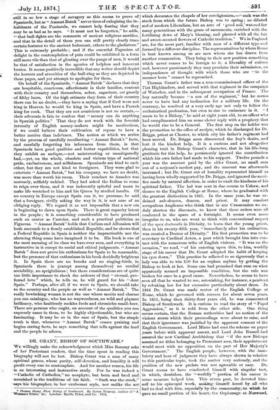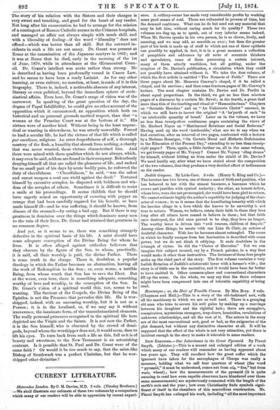DR. GRANT, BISHOP OF SOUTHWARK.*
`WE willingly make the acknowledgment which Miss Ramsay asks of her Protestant readers, • that the time spent in reading this biography will not be lost. Bishop -Grant was a man of many spiritual graces, whose purity, self-devotion, and humility it will profit every one to contemplate. And for another reason, his life is an interesting and instructive study. For he -was indeed a "Catholic of Catholics," no neophyte, but born and bred and nourished in the traditions of his faith. -" Such was the stock," says his biographer, in her exuberant style, not unlike the art Thomas Grant, First Bishop of Southnark. By Grace Ramsay, Author of "A Woman's Trials," &c. London: Smith, Elder, and Co. 1374.
which decorates the chapels of her coreligionists,—" such watkthe stock from which the future Bishop was to spring ; no diluted sod of modern Liberalism, but an acre of good soil,' watered-for many generations with the grace of sacraments, enriched with, the fertilising dews . of Mary's blessing, and planted with all the fair and sweet-scented flowers of Catholic tradition." We in England are, for the most part, familiar with men of a different tfpe-and formed by a different discipline. The representatives by whom Rome is best known among us are men whom she has •drawn from another communion. They bring to their new position something which never ceases to be foreign to it, a liberality of culture and, however passionately they may proclaim their submission, an independence of thought with which those who. are "to the manner born" cannot be reproached.
Thomas Grant's father was a non-commissioned officer of the 71st Highlanders, and served with that regiment in the campaign of Waterloo, and in the subsequent occupation of France. The boy naturally became " a son of the regiment,"- but .he seems never to have had any inclination for a military life. On the contrary, he resolved at a very early age not only.to follow 'the ecclesiastical profession,. but even to rise to eminence in it. " I mean to be a Bishop," he said at eight years old, to an officer who had complimented him on some clever reply with a prophecy that he would rise to be a GeneraL The first step on the ladder was the promotion to the office of acolyte,-which he discharged for -Dr. Briggs, priest at Chester, to which city his father's regiment had been moved. Dr. Briggs soon discovered the .boy's desire, and lent it the kindest help. It is a curious and not altogether pleasing trait in Bishop Grant's character, that in his life-long gratitude for this help, he persistently ignored the contribution which his own father had made to his support. Twelve pounds a year was the amount paid by the elder Grant, no small sum out of a serjeant's modest pay, and the amount was afterwards increased ; but Dr. Grant out of humility represented himself as having been wholly supported-by Dr. Briggs,- and ignored the sacri- fice made by natural affection, in order to exalt the kindness of his spiritual father. The lad was sent in due course to Ushaw, and thence to the English College at Rome, where-he: graduated with the greatest distinction in 1841. In the same year, he was or- dained sub-deacon, deacon, and priest. It may comfort scrupulous Anglicans who.think that in our Communion we un- duly shorten the diaconate, to know that these orders were all conferred in the space of a fortnight. It seems even more -irregular-to us, who are wont to think with conventional respect of the apex doctoralis in Divinity, to learn that the young priest, then in his twenty-fifth year, "immediately after his ordination, was created a Doctor of -Divinity." His first promotion was to be secretary to Cardinal Acton, a post which brought him into con- tact with the numerous tribe of English visitors. "It was on the occasion," we read, " of his entering upon this, to him, worldly stage of his career that Dr. Grant adopted the habit of keeping his eyes down." This practice he adhered to so rigorously that a lady was able to •win £50 for an . orphan asylum by getting the Bishop to look at her. Some one had promised that sum on what apparently seemed an impossible condition, but the rule was broken for once in a good cause. Nevertheless, he seems to have .seen all that he wanted to see, astonishing, for instance, a penitent by rebuking her for her excessive particularity about dress. In 1844 Dr. Grant was made rector of the English College at Rome, which- he governed with, success for about seven years. In 1851, being then thirty-four years old, he was consecrated Bishop of Southwark. It is curious to read the story of " Papal Aggression," as it is told from the other side. One thing seems certain, that the Roman authorities had no notion of the violent storm which their proceedings were about to -raise, and
that their ignorance was justified by the apparent consent of the English Government. Lord Minto had seen the scheme on paper years before with apparent assent, and Lord John Russell had assured the new Cardinal Archbishop that " if the new Bishops assumed no titles belonging to Protestant sees, their appointment would meet •with no opposition on the part• of Her Majesty's Government." The English people, however, with the inso- briety and heat of judgment they have always shown in relation to this particular topic, took the matter very seriously, and the position of the new prelate was not agreeable or easy. Dr. Grant seems to have conducted himself with singular tact, in which, doubtless, the "worldly "portion portion of this career in some measure helped him. This storm past, he devoted him- self to his episcopal work, making himself loved by all who had to deal with him. especially by the community, to which he gave no small portion of his heart, the Orphanage at Norwood.
The story of his relation with the Sisters and their charges is very sweet and touching, and good for the heart of any reader. Not long after his consecration he had to arrange for the mission of a contingent of Roman Catholic nurses to the Crimean hospitals, and managed an affair not always simple with much skill, and with a liberality of feeling—if the word " liberality " does not offend—which was better than all skill. But the outward in- cidents in such a life are not many. Dr. Grant was present at Rome at the canonisation of the Japanese martyrs in 1862; and it was at Rome that he died, early in the morning of the 1st of June, 1870, while in attendance at the CECumenical Coun- cil. Dr. Grant's intellect was acute rather than strong. He is described as having been profoundly versed in Canon Law, and be seems to have been a ready Latinist. As for any other learning, or even culture, no mention, at least, is made of it in this biography. There is, indeed, a noticeable absence of any interest, literary or even political, beyond the immediate sphere of eccle- siastical affairs. Even here, Dr. Grant's range of vision was of the narrowest. In speaking of the great question of the day, the dogma of Papal Infallibility, he could give no other account of the opposition which it encountered, an opposition which both on historical and on personal grounds merited respect, than that "a woman at the Prussian Court was at the bottom of it." His virtues were of another kind. Without being in the least unprac- tical or wanting in shrewdness, he was utterly unworldly. Forced to lead a secular life, he had the virtues of that life which is called par excellence, religious. An utter forgetfulness of self, a thorough mastery of the flesh, a humility that shrank from nothing, a charity that was never wearied, these virtues characterised him. And there were mixed with them qualities which do not always, which, it may even be said, seldom are found in their company. Relentlessly denying himself all that are called the pleasures of life, and racked for no small part of his days by acute bodily pain, he enforced the duty of cheerfulness. " Cheerfulness," he said, " was the safest and surest weapon a soul can wield against the devil." Tortured himself by excessive scruples, he disposed with boldness and wis- dom of the scruples of others. Sometimes it is difficult to resist a smile at his proceedings. It seems childish that he should have eagerly seized an opportunity of covering with pepper an orange that had been carefully sugared for his benefit, or have made himself ill—and he was suffering, it should be known, from disease of the stomach—by eating a bad egg. But if there is any greatness in dominion over the things which dominate many men to the ruin of their lives, Dr. Grant had attained that greatness in no common degree.
And yet, as it seems to us, there was something strangely defective in the spiritual basis of his life. A saint should have some adequate conception of the Divine Being for whom he lives. It is often alleged against orthodox believers that they obscure by the figure of the Son, to whom, practically, it is said, all their worship is paid, the divine Father. There is some truth in the charge. There is, doubtless, a popular theology in which the Father becomes an abstraction, leaving all the work of Redemption to the Son ; or, even worse, a terrible Being, from whose wrath that Son has to save the Elect. But at the worst, even here, there is something adequate, something worthy of love and worship, in the conception of the Son. In Dr. Grant's vision of a spiritual world this, too, seems to be wanting. The Saviour of the Gospels, the Divine Being of the Epistles, is not the Presence that pervades this life. He is wor- shipped, indeed, with an unceasing worship, but it is not as a Person ; it is in the localised, or, if we may say it without irreverence, the inanimate form, of the• transubstantiated elements. The really personal presences recognised in the spiritual life here depicted are the Virgin and the Saints. It is not now the Father, it is the Son himself, who is obscured by the crowd of demi- gods, beyond whom the worshipper does not, it would seem, dare to lift his eyes. To turn back from such a life as this, full as it is of beauty and sweetness, to the New Testament is an astonishing contrast. Is it possible that St. Paul and Dr. Grant were of the same faith ? Or would it be too much to say, that the saint-like Bishop of Southwark was a perfect Christian, but that he wor- shipped other divinities ?



































 Previous page
Previous page